SEO requirements keep changing and it can be difficult to keep up with the latest developments. Well-optimized sites get more and more traffic over time, and that means more leads and sales . Without SEO, search engines won't be able to find your site, and all your hard work will be wasted.
In this guide, we are going to share and discuss the essential SEO ranking factors you need to master SERPs.
We've put together this handy table of contents in case you want to move on to the SEO ranking factors that are most interesting to you:
What are the most important SEO ranking factors?
- A safe and accessible website
- Page speed (including mobile page speed)
- Mobile friendliness
- Domain age, URL and Authority
- Optimized content
- Technical SEO
- User experience (RankBrain)
- Links
- Social signals
- Real business information
Before we get into the details of each ranking factor, let's take a quick look at the basics of how search engine rankings work.
Understanding SEO, or "How do I rank higher on Google?"
Many people wonder how Google searches work, so before we get into the actual search engine defining factors, let's start by answering some of the basic questions most people have about SEO.
What is the «Ranking» in SEO?
As you may already know, SEO stands for Searching Engine optimization, which simply means improving web pages for search engine rankings, but how exactly does that work?
Let's find out.
In SEO, ranking refers to the position of your content on search engine results pages (SERPs). A classification n. 1 means that when people search for a particular term, your web page is the first result (aside from promoted results, featured snippets, and response boxes, which we'll talk about later in this guide).
Appearing in the top 3 results is great because almost half of the clicks on any search results page go to those positions.
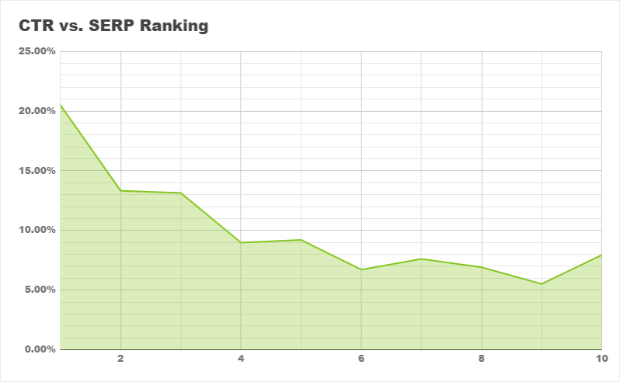
Appearing on the first page, within the top 10 results, is also helpful. This is because 95% of people never get past the first page (The best place to hide a dead person is the 2nd page of Google)
What does Google want from SEO?
Google's own stated purpose is "to organize the world's information and make it universally accessible and useful." Delivering relevant search results is a big part of that. This is how they work:
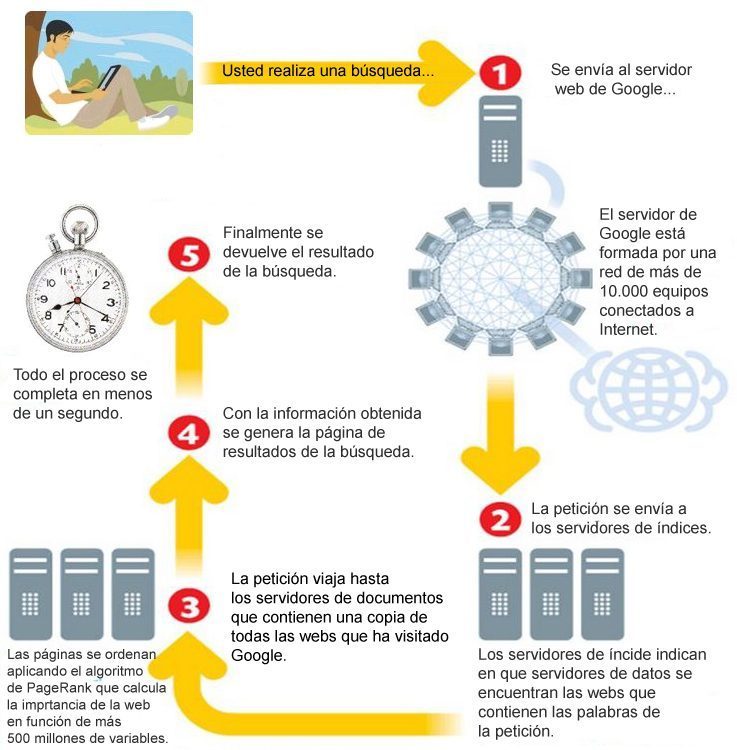
First, Google's search robots (pieces of automated software called "spiders") crawl the web… All it really means is that they visit web pages.
Second, they add properly optimized and crawlable pages to Google's index and catalog them.
Third, when people search Google, it shows what you think are the most appropriate results based on the search terms they enter (out of the trillions of pages in Google's index).
At that point, you have to rely on your page titles and meta descriptions for search engines to click. its link and visit its site.
How do Google search rankings work?
When people want to find information, they write or say words related to what they are looking for. Those are called "keywords" and we'll look at them in the content optimization section of this guide.
But search engine rankings aren't just keywords; It's also about the quality of the information.
According to their own search quality ratings of Google, when indexing the main content of each page, checks factors such as:
- The purpose of the page
- Experience, authority and trustworthiness, not only of the site and the content of the page, but also the experience of the individual creator of the content.
- Quality content and quantity
- Website information and content creator information
- Website reputation and content creator reputation
These go into your ranking algorithm and help determine SEO ranking.
Based on the rating guidelines above, Google shows search engines the most relevant and high-quality results related to what they are looking for. The most relevant ones are shown first, and the rest are shown on successive pages.
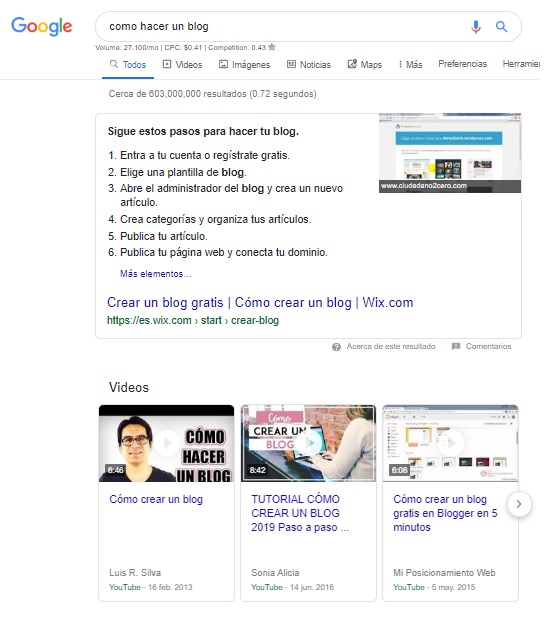
One of the goals of addressing SEO ranking factors is to inform Google when your pages on your site are relevant to particular search queries, so that people will click on the links and visit your site.
Let's be clear though: there is never a guarantee of a page rank one or # 1, and with SEO guidelines changing all the time, search engine rankings change with them.
What is SEO-onpage and SEO-offpage?
Two terms that you will hear mentioned a lot when discussing SEO ranking factors are on-page SEO and off-page SEO.
On-page SEO refers to factors on your own website that you can optimize, such as code behind and content.
Off-page SEO refers to actions taken off-site to affect the trustworthiness and authority of your site by building the correct inbound links and social signals.
Both types are included in the main SEO ranking factors.
How to monitor search engine rankings
Before you can improve your SEO ranking, you will need to know your starting point.
There are a couple of ways to find this. First, you can search Google using terms that you think your customers will use. Use an incognito or private window in your browser, so the results are not skewed by Google's customization. See where your content appears.
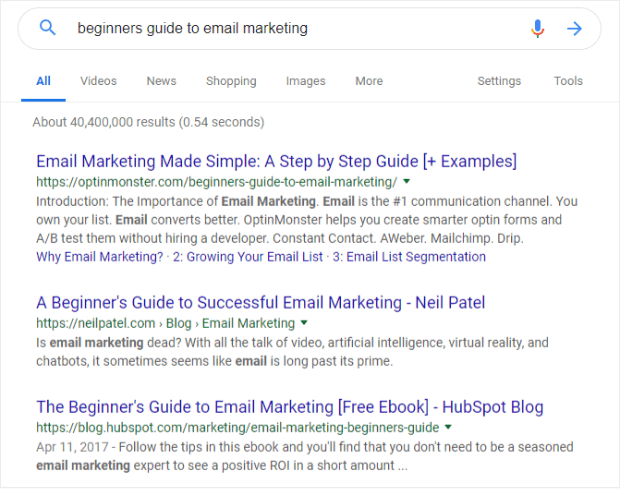
However, that's totally impractical for established sites with hundreds of pages, so you'll need a tool to do it for you. For example, with SEMRush , you can type your domain into the search box, wait for the report to run, and see the top organic keywords you're ranking for. Or use your keyword position tracking tool to track the exact keywords you're trying to rank for.
See other keyword research tools in our guide.
Now let's take a look at Google's top ranking factors for 2019 in detail.
1. A safe and accessible website
Unsurprisingly, the first of our SEO ranking factors has to do with having the correct type of URL. Specifically, that is a URL that Google bots can easily reach and crawl.
In other words, Google must be able to visit the URL and look at the page content to begin to understand what that page is about. To help the bots, you will need:
- A website built with a well-coded website builder
- A robots.txt file which tells Google where it can and cannot look up your site information
- A sitemap, which lists all of your pages. If you are running a WordPress site, you can set up a sitemap through Yoast SEO. Otherwise, you can use a online sitemap generator .

HTTPS is not a factor in deciding whether or not to index a page, but Google's own John Mueller has tweeted that it is a "light ranking factor" and that "having HTTPS is great for users." We agree on R Marketing Digital.

If you don't have SSL enabled on your website yet, you should consider doing so to improve your rankings.
2. Page speed (including mobile page speed)
Page speed has been cited as one of the top SEO ranking factors for years. Google wants to improve the user experience on the web, and fast-loading web pages will definitely do that.
Google announced a search engine algorithm update focused on mobile page speed that will start to affect sites from July 2018. If your site doesn't load quickly on mobile devices then you could be penalized.
Use the mobile test tool Google to see how your site compares.
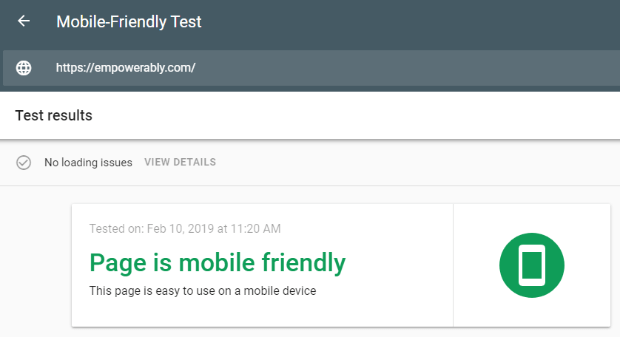
3. Mobile friendliness
While we are on the topic of mobile devices, mobile usability is another important SEO ranking factor. More people use mobile devices than desktop computers to access the web, and that's one reason why there have been changes in the way Google ranks search results.
The index of Google for mobile devices it's now a reality, which means you get your results from mobile-optimized sites first, rather than desktop-oriented sites. If your site is not optimized for mobile devices, You risk being left in the dark on the 2nd page and beyond, at least in terms of SEO.
Many of the SEO ranking factors we'll look at in this article will help you lay the foundation for good search engine rankings, but you also need to take care of the user experience when people land on your site.
Things to consider include:
- If you have a responsive site that automatically resizes to fit the device
- If you use large fonts to make it easier to read on a small screen
- Accessibility and navigability, including ease of touching menus
- Make sure essential content is not hidden by interstitial ads
4. Age of the domain, URL and authority
Did you know that almost 60% of sites that have one of the top ten Google search rankings are three years old or older? The data of a study from Ahrefs two million pages suggest that very few sites less than a year old achieve that ranking. So if you've had your site for a while and optimized it using the tips in this article, that's already a bonus.
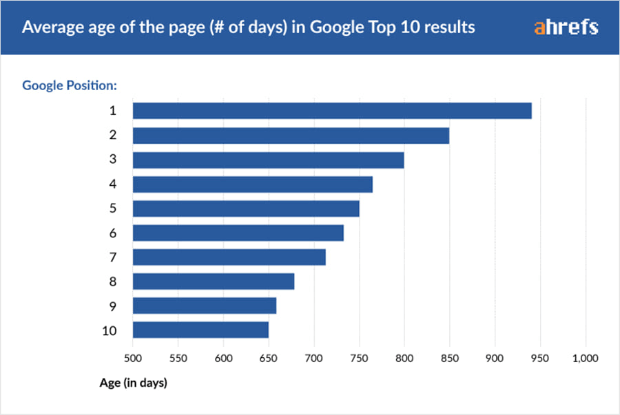
In some cases, the domain name is important. Although Google has penalized exact match domains (those where the target keyword is in the URL), that penalty is generally for spam sites with reduced content
When it comes to search engine ranking factors, authority is important. As you will see, it is usually a combination of great content (see the next tip) and off-page SEO signals, such as inbound links and social media shares.
Moz has coded this into scores of page authority and authority of domain , both ranked from 0 to 100, telling you how likely a particular page or domain is to rank in search results.
You can check domain authority or page authority with Open Site Explorer. Just plug your URL into the search box on the site and you will get a report showing domain authority, page authority, established links, and new links.

We'll see more about linking practices to improve SEO rankings in # tip 8.
5. Optimized content
We've talked a lot about content in this Google SEO ranking factors guide. This is because it is one of the most important search ranking factors (at the height of user experience, links and RankBrain, which we will see in a moment). Now let's dive in and see what it really means to optimize content for SEO.
The Google search algorithm is based on keywords. These are the words and phrases that search engines use when looking for information. They are also the words and phrases that describe the topics your site is about. Ideally, those will match.
This is why it is so important to use keywords in your content.
One negative SEO ranking factor to consider is duplicate content. For SEO, fresh and original content is always the best. And if you have similar content, tell Google which one should rank as the most authoritative by using Canonical URLs .
Understand LSI keywords and SEO ranking
It's not just about the main keywords, either; It is also important to include terms related to the main terms that people search for. These are called LSI (latent semantic indexing) keywords. They provide a kind of online word association to help Google know what results to return.
For example, using the correct LSI keywords will tell Google that when search engines type "mini," your page is relevant to the car, rather than the skirt, and vice versa.
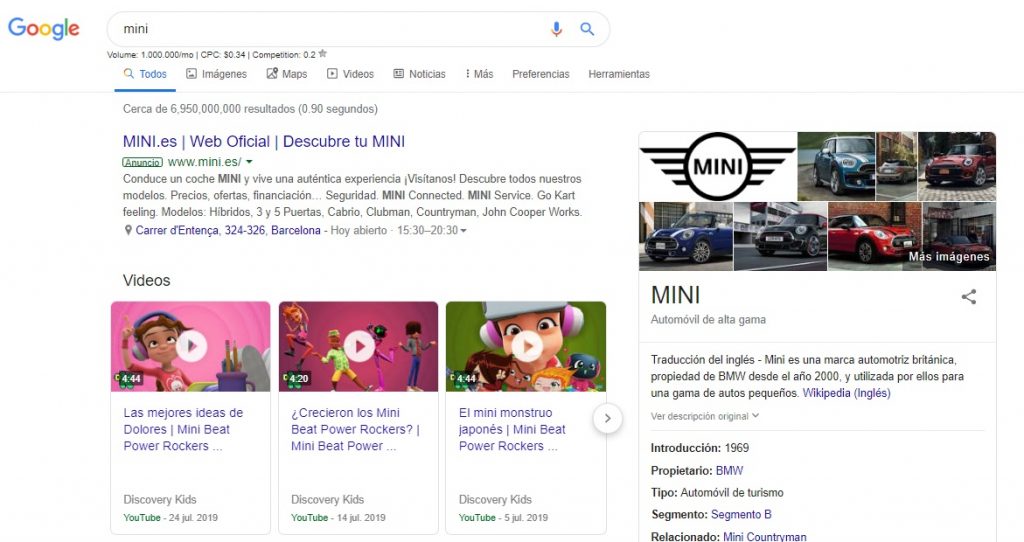
It is worth noting that as more people perform voice searches , content optimization includes natural language query and search optimization.
However, here's an important point: keyword stuffing (popping keywords left and right) is absolutely forbidden because it will result in poor quality web pages and really hurt your SEO rankings.
Understand search intent for content optimization
The search intention it is also important when optimizing content. That means understanding what people are really looking for when they type in search keywords.
For example, let's say you've identified "Florida real estate" as a keyword that you want to rank for. You may think that writing content for people looking for real estate in Florida is a good idea. But if the people searching for that term are real estate agents who are also looking to sell, then your content won't meet your needs and your page won't rank.
Sometimes it is clear what people are looking for. For example, if they use the word "compare," they are probably trying to make a decision about buying a product. And if they use the word "buy," then they are looking to make a purchase.
The keywords they use will change depending on whether they want to:
- find a particular website (navigation)
- get the answer to a question (informative)
- obtain information before making a purchase (in research)
- to make a purchase (transactional)
Well-optimized business sites will include content for each of those search types.
Is content length an SEO ranking factor?
In a word, yes. Google wants the content to be of quality and have a certain length. While writing more just to stretch the length is never advisable, if a subject requires depth, give them depth.
An investigation suggests that content of more than 2000 words earns more than the top ten positions in Google search engine rankings.
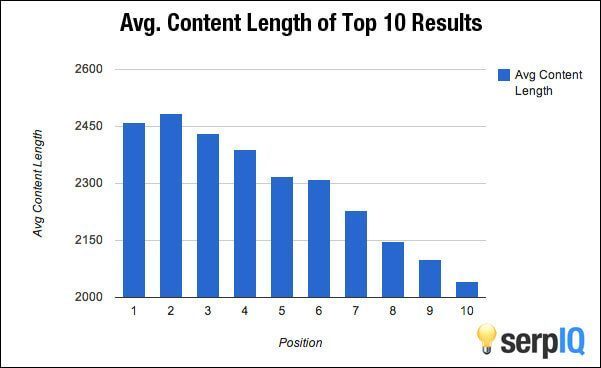
The content plus long too attract more links and shares , which are 2 other important ranking signals.
SEO Ranking Factors - Response Charts
Google is offering more and more answers via featured answer boxes, so that's another aspect of optimizing for better search engine rankings. This is what an answer box looks like:
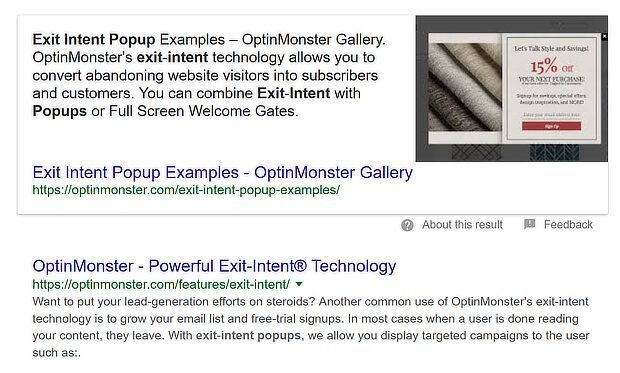
Our experience with clients suggests that optimizing response boxes means:
- Answering questions, of course
- Including questions as headings, with properly formatted title tags (more on that in the next tip)
- Make sure the answers are correct, relevant and not too long.
- Target content to keywords that already have response boxes
- Including lists or tables
Use of video to improve SEO ranking
According Cisco , video content will account for a whopping 80% of online traffic by 2021.
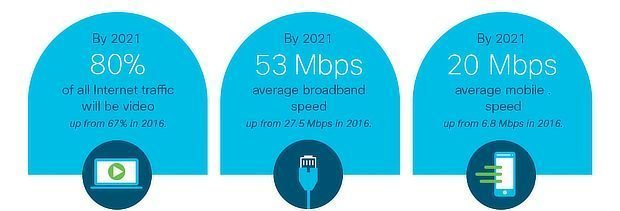
Definitely start including video in your content strategy (YouTube belongs to Google). The video is read, shared and linked, providing many signals to amplify your search ranking.
6. Technical SEO
We said earlier that getting the code right is one aspect of optimizing content for better search engine rankings. These are some of the things to keep in mind:
- Use keyword phrases in page titles, which is where Google first looks to determine what content is relevant to each search. You will see the page title as the first line of a search results entry.
- Use heading tags to show the content hierarchy. If your title is formatted as h1, use h2 or h3 for subtitles.
- Create a meta description that attracts readers and includes your keyword phrase. Keep meta descriptions short and elegant - it's around 160 characters long to convince search engines that this is the publication they want.
- Use keyword phrases in the image alt tags to show how the images are relevant to the main content. Google also has an image search, which is another way for people to find your content.
- Where appropriate, it is advisable to use outline marking to tell Google what kind of content you are producing. It is a kind of tab with standard fields where data from our page is loaded. This can also help your content appear in rich card entries other than answer boxes.
7. User experience (RankBrain)
For a while, Google has been using artificial intelligence to better classify web pages. Call that signal RankBrain . This includes other signals that affect your search engine ranking. These are:
- Clickthrough rate - the percentage of people who click to visit your site after an entry comes up in search results
- Bounce Rate - the number of people bouncing back, which basically means your site didn't give them what they wanted
- Stay time : how long they stay on your site after arriving.
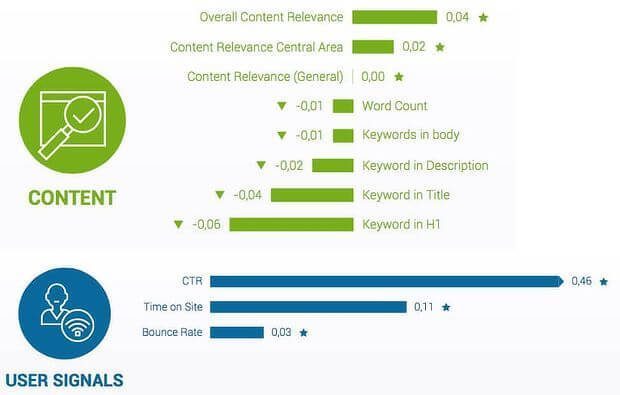
If people come to your site, they don't like it and they leave, Google will think it is not relevant to your needs. If enough people do this, then it could be more difficult for your site to rank higher in search results.
Conversely, if people click through to your web page and hang around for a bit, that tells Google that your content is relevant to their search.
So when titles, descriptions, and content are optimized for clicks and value at the other end, you can increase your search engine ranking.
8. Links
As we said at the beginning, the web is based on links, so naturally, links are a crucial SEO ranking signal. There are three types of links to think about:
- Inbound links
- Outgoing links
- Internal links (interlinking)
Google uses inbound links as a way to help determine how authoritative and relevant your content is.
The best case is when an authoritative site includes a relevant link to your site in a relevant part of its content. So if the Content Marketing Institute includes a link to your content marketing resource, that will be perceived better than if a random person with a low-quality site links to it.
Ideally, you want to have very few inbound links from low-quality domains. You can find your inbound links using a tool like SEMRush or one of the keyword research tools shared earlier in this guide.
At the same time, you want to show that you are creating quality content for your visitors and that it is good to link to relevant and authoritative sites in your niche.
Finally, linking to your own content can help bring pages together for both Google and your visitors, making each page more valuable. If you have an authoritative page and a link to another page on your site, that helps visitors find the other page and passes some of that authority over. That will help that second page increase your search engine ranking.
9. Social signals
When people share your content on social media, that's another sign that it's valuable. The study SEO cognitive out of 23 million shares found a definitive link between social shares and search engine ranking.
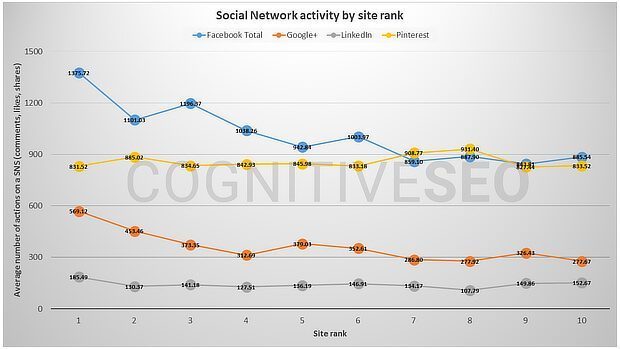
The official word from Google is that social actions are not a direct ranking factor . Links from Twitter or Facebook do not count the same as links from other authorized websites.
Still, there is no denying that the pages with the highest ranking in Google search results generally have a lot of shares, probably because the more your content is shared, the more people will see it and decide to link to it. That means getting more shares on social media helps your search engine ranking , even if only indirectly.
Not only do you need to have a social media presence, you need to make it easy to share your content and amplify those social signals.
10. Real business information
This tip is important for businesses targeting particular local areas. The presence or absence of business information is one of the most important local SEO ranking factors.
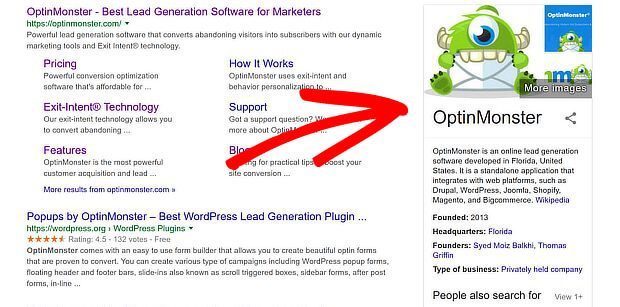
Therefore, it is important to take care of areas such as:
- Name, address, phone number
- List of companies in Google My Business and Facebook
- The correct local search terms

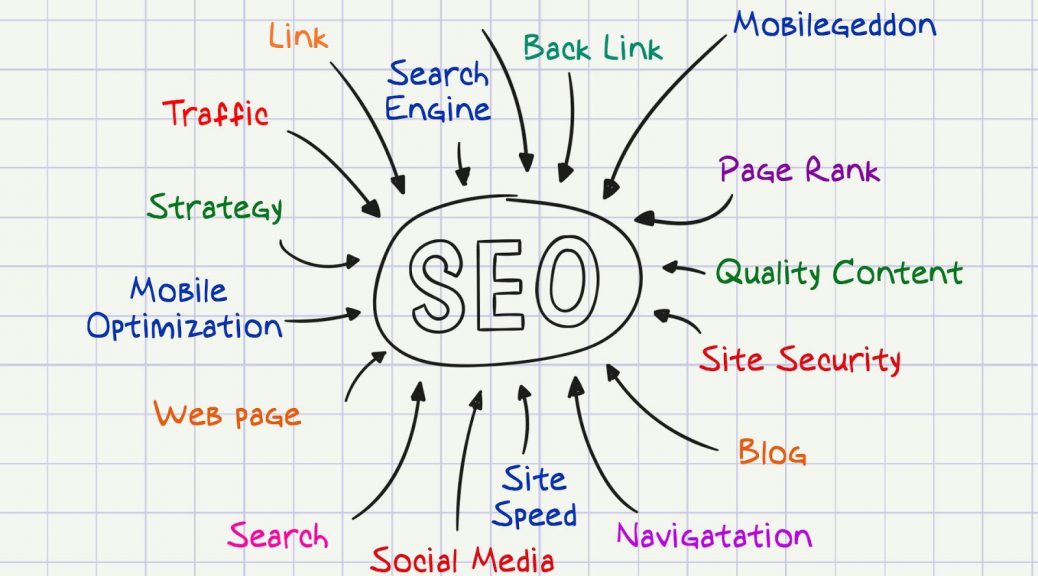


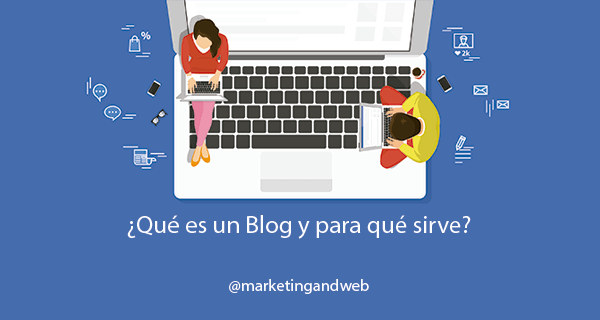
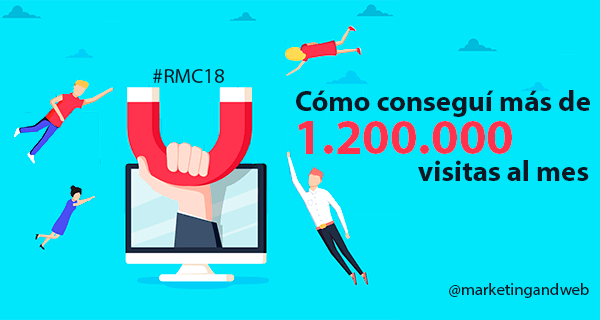
![SEO Guide for WordPress + SEO Tutorial for Ecommerce [SEO On Page Video Tutorial]](https://rmarketingdigital.com/wp-content/uploads/2020/11/guia-seo-para-wordpress-4887479-e1620380188678-600x294.png)


